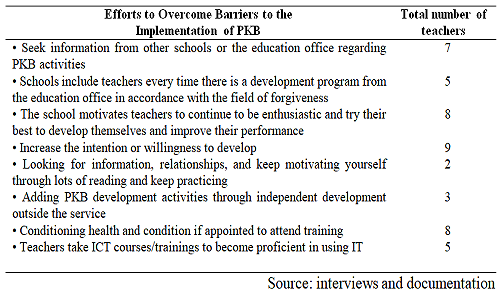
Analysis of Sustainable Teacher Professionalism Development of Post-Certification in SD Negeri Medang Kampai District, Dumai City
Abstract
Keywords
Full Text:
PDFReferences
Daryanto. (2013). Guru Profesional. Yogyakarta: Penerbit Gava Media.
Edy, S. (2015). Analisis Pengembangan Profesionalisme Guru. Jakarta
Fajarwati, D. (2019). Rencana Pengembangan Keprofesian Berkelanjutan (MPPKS-PKB). Direktorat Jenderal Guru dan Tenaga Kependidikan
Hadi, F. S. (2015). Pengembangan Profesionalisme Guru Berkelanjutan Pasca Sertifikasi Di SMK PGRI 1 Ngawi (Studi pada Guru-Guru Bersertifikat Pendidik di SMK PGRI 1 Ngawi) (Doctoral dissertation, Universitas Muhammadiyah Surakarta).
Hasanah, A. (2012). Pengembangan Profesi Guru. Bandung: Pustaka Setia
Masyhud, M. S. (2014). Manajemen Profesi Pendidikan. Yogyakarta: Kurnia Salam Semesta.
Moleong, L. J. (2006). Metode penelitian kualitatif edisi revisi. Bandung: Remaja Rosdakarya.
Moleong, L. J. (2013). Metodologi Penelitian Kualitatif. Bandung: PT Remaja Rosdakarya.
Murni. (2015). Analisis Pengembangan Keprofesian Berkelanjutan Guru SMK Muhammadiyah 3 dan 6 Gemolang Sragen. Laporan Penelitian
Permenneg PAN dan RB Nomor 16 Tahun 2009 Bab V Pasal 11
Prihatna, N & Sukamto,T. (2013). Pengembangan Profesi Guru. Bandung: PT Remaja Rosdakarya.
Rahmawati, R., Nurzaima, N., & Nasir, N. (2019). Pengembangan Profesi Berkelanjutan Guru SMA Negeri Kota Kendari. Didaktis: Jurnal Pendidikan dan Ilmu Pengetahuan, 19(2).
Satyarini, M. D. (2013). Menuju Kesiapan Guru Dalam Pengembangan Keprofesian Berkelanjutan. PAWIYATAN, 20(4).
Saud, U. S. (2013). Pengembangan Profesi Guru. Bandung: Alfabeta.
Sugiyono. (2017). Metode Penelitian Kualitatif. Bandung: Alfabeta
Sulhan, N. (2017). Karakter Guru Abad 21. Sidoarjo: Masmedia
Syuroh, M. (2017). Panduan Praktis Karya Tulis Ilmiah. Yogyakarta: Pustaka Felicha
Warso, A. W. D. D. (2016). Publikasi Ilmiah Pembuatan Buku, Modul, Diktat. Yogyakarta: Pustaka Pelajar.
Waryono. (2015). Menjadi Guru Profesional melalui Penyusunan Karya Inovasi.http://lpmpjogja.kemdikbud.go.id/wp-content/uploads/2015/02/Menjadi-guru-profesional_Waryono.pdf,
Wijiutami, C. T., & Wahjoedi, W. (2020). Pengembangan Keprofesian Berkelanjutan bagi Guru Sekolah Dasar. Jurnal Pendidikan: Teori, Penelitian, dan Pengembangan, 5(5), 666-670.
DOI: http://dx.doi.org/10.31258/jes.6.1.p.46-55
Refbacks
- There are currently no refbacks.
Copyright (c) 2022 Juniar Juniar

This work is licensed under a Creative Commons Attribution 4.0 International License.
Publisher: FKIP Universitas Riau













